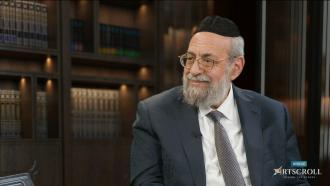Baltimore, MD - June 27, 2017 - In many ways, Rabbi Meir Zlotowitz changed my life.
Over 15 years ago, I submitted a choppy, half-baked book sample to ArtScroll, containing only 10 stories. I had no idea what went into writing a book. I imagine that ArtScroll was very surprised when they received it; it was incredibly raw, completely unedited, and downright embarrassing.
However, Reb Meir and his partner, Rabbi Nosson Scherman, another mentor of mine, accepted it. When I asked how they could take a book without seeing all of the stories, the response was straightforward: "Chiely, we believe in you."
I owe so much to Reb Meir. Not only did he believe in me, but he envisioned for me that which I never dreamed of becoming. He saw in me abilities that I never knew I had. And I was just one of many novices he took under his wing.
When my first book was published, the ad placed by ArtScroll publicizing the book had a teaser that read, "Introducing a brand-new series." Series? I thought to myself. Who said I'm writing a series?
But that was before I got to know Reb Meir.
He dreamed big — not just big, but game-changing big.
And nowadays, we would be hard-pressed to find a home that does not have at least one member affected — either directly or indirectly — by the ArtScroll revolution.
I have a friend who has some learning challenges. Five years ago, after the Siyum HaShas in MetLife Stadium, he told me that he had made his own siyum on Shas. I was somewhat skeptical. Then he told me that he knows he's not capable of learning an entire page of Gemara every day, but he is capable of learning one idea on every page every day. And that was his siyum, a siyum on one idea from every page of Shas. He punctuated his announcement, "Don't you know, with ArtScroll, nothing is impossible."
There you have it.
The Gemara (Eruvin 13b) informs us: "Lo Rabbi Meir sh'mo ella Rabbi Nehorai. V'lomah nikra sh'mo Rabbi Meir, she'hu meir einei Chachomim b'halachah — Rabbi Meir's name was not really Rabbi Meir, but Rabbi Nehorai. Why, then, was he called Rabbi Meir? Because he lit up the eyes of the Sages with halachah."
Our Reb Meir taught generations that nothing is impossible, thereby dispelling the darkness and lighting up our eyes.
How fitting that he was taken from This World on the last day of Sivan, the first day of Rosh Chodesh Tammuz. Sivan is the month of kabbolas hatorah, and no one individual made Torah more accessible than Reb Meir. The month of Tammuz is one of the spiritually darker months of the year. It is the month in which the Luchos were broken.
After Hitler, y's, destroyed much of the Torah world, there were many, many broken pieces and broken lives that needed to be rebuilt. The gedolei Yisroel, led by Rav Aharon Kotler and the Ponovezher Rav, miraculously accomplished that goal. But after 30 years, the children of survivors began to raise their own families. An explosion of Torah was on the horizon, and someone was needed to give the laymen a chance to converse with their children, budding young talmidei chachomim. Someone had to bridge the gap.
Enter Reb Meir, guardian of our legacy.
Assembling an unparalleled team of erudite and articulate talmidei chachomim, Reb Meir facilitated the teaching of Torah to the masses. Rookies in learning now had Shas at their fingertips; no longer were fathers stuck when their children came home from yeshiva, ready to learn a Gemara their fathers had never seen before. Aggadeta Gemaros were given their due, with precise translations and explanations to elucidate those cryptic lines.
Driven to mend the broken Luchos, Reb Meir made use of his immense kochos.
But he didn't rest there.
Soon it was time for the ArtScroll Hebrew Shas, Bavli and Yerushalmi, both used extensively by the Torah giants of our generation. For example, Rav Getzel Fried, a relative of mine and a talmid chochom muflag, often made use of the Hebrew volumes because he very much enjoyed the footnotes.
And the catalog keeps growing.
Though I was a young boy at the time, I vividly remember my father's standing order at Frank's Hebrew Bookstore in Cleveland. Mr. Frank would bring the latest editions to the ArtScroll library to my father in the morning at davening. What an event it was each time. At one point, I asked my father why he gets everything ArtScroll publishes. He told me, “Everything they put out is so good.”
Nothing has changed. It was true when ArtScroll first went into business, and it's still true today. If anything, they've gotten better over time
There was always one constant, Rabbi Zlotowitz’s seal of approval.
Baruch Hashem, I know the satisfaction of receiving that approval.
Upon hearing the news of his passing, I read through the many emails we shared over the last 15 years. Reb Meir was effusive in his love, and he treated me with great yedidus. He often addressed me as "Tiyere Chiely" and signed off as "Uncle Meir." The final email I sent to him was moments before I went to my son's kabbolas panim, just a few weeks ago, when I caught wind of his illness and its seriousness. But despite the precarious situation, his son Gedaliah, a close friend, made sure to come to the chasunah to say mazel tov, as did his son-in-law, Reb Asher Dicker, on his way to the hospital. It was Reb Meir who often stressed how important it is to go to friends' simchos. Attending a levayah, he explained, is a fulfillment of a chiyuv, an obligation, while attending a simchah is a sign of yedidus.
When Reb Meir was pleased and he praised my work, I floated on cloud nine. At the same time, when the need arose, he was pointed and direct in his critique, spot-on regarding what had to be fixed. When he was disappointed, he let me know in no uncertain terms that I was capable of better; no sugar coating when it came to the exactness of Torah, and I worked hard to improve.
Yes, Reb Meir was a perfectionist; he had to be. Above all else, Reb Meir was the guardian of our legacy, standing for mesorah — unmitigated, uncompromised mesorah. The Mesorah Heritage Foundation, so aptly named, provides just that, an undiluted transmission of mesorah.
Reb Meir once told me that he walked away from a dedication worth three-quarters of a million dollars because the people who were ready to give the money insisted on using phraseology that Reb Meir felt compromised the standards of our mesorah. Similarly, he maintained close friendships with Rav Dovid Feinstein, shlita, with whom he enjoyed weekly get-togethers, and Rav Dovid Cohen, shlita, who advised him and also paskened for ArtScroll. Reb Meir always sought the guidance of gedolim and adhered to every word they said. Though known as a most effective negotiator, when it came to daas Torah, there was nothing to discuss.
Rav Mordechai Gifter, rosh yeshiva of Yeshivas Telshe in Cleveland and one of ArtScroll's first enthusiasts, discussed how Hillel entrusted Rabban Yochonon Ben Zakai to transmit the mesorah, tradition, from his generation to the next. The Rambam, in his Mishneh Torah, describes how Torah was transmitted through 40 generations: From Moshe at Har Sinai until Rav Ashi and the completion of Talmud Bavli, each generation would carefully transmit it to the next. But the Gemara in Succah (28a) mentions that the smallest of Hillel’s talmidim was Rabban Yochonon Ben Zakai. This begs the question. Why did he entrust the mesorah to the smallest of his talmidim, and not his greatest talmid, Yonoson Ben Uziel?
The answer is: The baal hamesorah, who is designated to transmit the tradition from one generation to the next, is not necessarily the greatest talmid chochom and genius. Rather, it is the one who best makes the transition from the previous generation to the present one.
Reb Meir was that individual.
Guardian of Torah.
Guardian of creativity and brilliance and understanding.
Guardian of vision and candor and truth.
Guardian of light.
We often throw around words like irreplaceable and visionary, and then when we describe an individual who truly deserves such accolades, the message gets lost.
Reb Meir WAS a visionary. Reb Meir IS irreplaceable.
Today I am very sad. I'm sad for the entire Zlotowitz family: Mrs. Rochel Zlotowitz, their wonderful children and grandchildren, many of whom are considered good friends of mine, especially Gedaliah, who is one of the most exceptional people I know.
But mostly, I am sad for Klal Yisroel.
Who will be the one to guard our legacy, to dream for us when we lack the courage, vision, and strength to dream for ourselves?
Who will make the impossible possible?

















